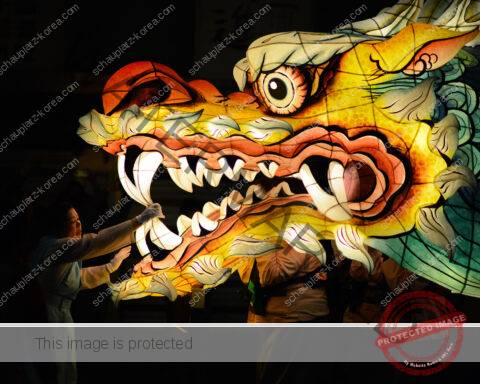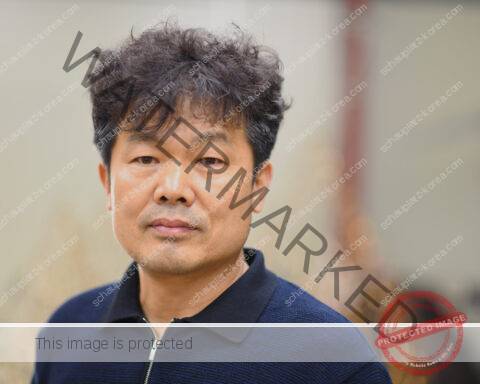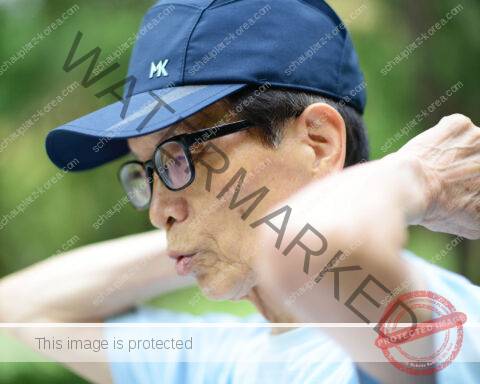The official name of the holiday “Buddha’s Birthday” reads “The Day When the Buddha Came” (Bucheonim osin nal, 부처님오신날). Buddhist temples in Korea have been covered with colorful lotus flower shaped lanterns in the week-long celebrations leading up to this public holiday.
To celebrate Buddha’s 2,565th birthday, various Dharma Ceremonies are usually held across Korea. Among them, one of the largest ceremonies takes place at Seoul’s Jogyesa Temple, the center of the Jogye Order of Korean Buddhism.
Last year and also this year due to the pandemic special rules apply. Dharma Ceremony, celebrations and parades are possible only in small gatherings. Broadcasting via live streaming catapults a thousand-year-old tradition into the remote corners across the country.
The unique occasion of this year’s ‘not so busy preparation time ahead of Buddha’s birthday lead us to speak to Venerable Hyewon 헤원 수님 (36). Ven. Hyewon leads the Templestay program at Seoul’s Jogyesa Temple. The Templestay program is a wide-open gate for those who want to experience the monastic culture.
What is your role and function in the Jogye order?
I am responsible for the Templestay program and organizing and teaching together with my team in Jogyesa temple.
At first, my parents did not allow me to take this path, whereupon I began to seriously question my life and future.
Hewon 헤원 수님
How did you come to Buddhism?
As far back I can remember, when I was young, we often visited Buddhist temples. Then, I met a lot of monks and learned about how to lead a good life and share kindness with other people. I also wanted to live a happy life and dreamt of becoming someone who can do so. As my parents told me that already with 5 years, I apparently said that I want to become a Buddhist nun. However, when I turned 20, I seriously started to question my life and the future. At first, my parents did not allow me to go down that road – I first had concluded my studies at the university. [Most Korean monks and nuns receive a traditional academic education in addition to ritual training, which is not necessarily in a formal ritual training program.] Finally, with 25 years I became a nun. I am now 36 and for 10 years I am practicing the life of a Buddhist nun.

How did your family and friends react when you decided to join Buddhism?
Well, as mentioned my parents were fine with my decision to pursue my dream, and therefore, I could move on without worries. To my friends, I did not talk about it as I thought my decision is about my life and others are not leading my life. Later on, when I met my friends and they saw how happy I am they were receiving it very positively.
Have you ever doubted the decision becoming a Buddhist Nun?
No, I have never doubted the decision. When I was young, I was often thinking about my own “leaving of home and becoming a monk” 출가 and now that I can live my dream, I am very happy and satisfied with it. I also want other people to know that Buddhism is a very happy and generous religion.
How does your daily routine look like?
I wake up at 4 am and start with chanting together with the other monks and nuns. We do the Buddhist ceremony “Ye-bul” 예불 three times a day. These ceremonies are rituals in which we show respect and make offerings to the Buddhas enshrined in the Dharma Hall. Thereafter, around 6 am we have breakfast, a monastic meal which is called “gong-yang” 공양. It is not only a way of eating but also a part of Buddhist practice. Thus, it is also considered a Dharma offering. Thereafter between 7 and 11 I study the Sutra / Dharma (간경) and fulfill my work (소임) which requires a lot of administrative work for the templestay program. Lunch will be held from 11 to 12 and thereafter the “so-im” 소임 continues. After the dinner, which is around 6 pm I have time to study the Sutra / Dharma (간경). Around 9 pm I finish the day and rest until a new day starts.
Eating is also a practice of cleaning your body and mind called 수행 suhaeng.
Hyewon 헤원 수님
What do Buddhist monks eat, are there any dietary restrictions?
Eating is also a practice of cleaning your body and mind called 수행 suhaeng. It also teaches us sharing, having a meal with our colleague monks and nuns we usually do a “Pre-meal Chant” that goes like this:
Where has this food come from? My virtues are so few that I am hardly worthy to receive it. I will take it as medicine to get rid of greed in my mind and to maintain my physical being in order to achieve enlightenment.
In general, we try not to overeat and focus on absorbing “good energy” from food. This is mainly found in vegetables. For example, we do not eat garlic, as garlic has not a favorable energy. One of the teachings of Buddhism prohibits killing animals and consuming the meat. But there are exceptions when you can eat meat, which is as long as the animals are not specifically killed to feed me or the person who would eat it.
In Buddhism there is the talk of “cultivating the mind”, what exactly is it about? And, do you realized the change, or development and if so how?
In Buddhism we practice every day 수행 suhaeng and this is the constant training for the mind. The change and development I realize through the daily chanting and reading the Dharma we learn the different state of mindfulness and a comfortable feeling and happiness. I can also see the smile on my and other’s face. It’s not a ‘one thing in one moment” more so through an ever-evolving practice I see, realize and feel a change compared to yesterday.

Are you afraid of the death?
As a Buddhist I believe in reincarnation, meaning there will come a time when my body and mind will “die” but the soul will go on and being reborn in another body. Therefore, I am not afraid of the death.
Why do we celebrate Buddha’s birthday today?
Gotama Siddharta was the name prior he decided to become a monk with 29 years (출가), and after 6 years of (수행) practicing suhaeng he was enlightened – which we call Buddha (the enlightened one). He then live for 45 years as Buddha teaching the Dharma/Buddhism. Buddha was born on 8th April, 2565 years ago, in accordance with the lunar calendar.
What does Buddha’s Birthday mean to you?
Enlightenment….It means for me “the day to lead a new life”…and appreciate and be grateful that Buddha made this journey to also let her live the dream of a Buddhist nun.
Is there a special daily routine for you as a Buddhist nun on Buddha’s Birthday?
“Taking a bath” 관불 gwanbul is originating from the tale of the nine dragons washing Buddha. We still do this ritual on Buddha’s birthday today. There is also the 연등회 yeonduenghoi the Lotos lantern festival which symbolizes enlightenment in contrast to the living in darkness: being greedy etc… The Lotus lantern festival has become a UNESCO intangible asset.

What do you wish for the future?
That I cultivate a warm heart and can share the lessons from Buddha.
Thank you very much for the interview and your warm hospitality





